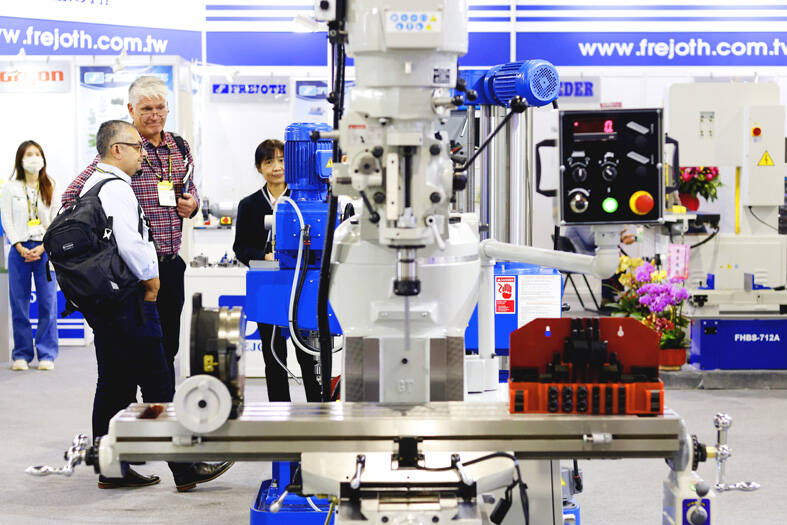Of the 90 countries that made deals at this year’s Taipei International Machine Tool Show held last week at the Nangang Exhibition Center in Taipei, India was the biggest buyer, the Taiwan External Trade Development Council (TAITRA) said on Saturday.
The council, which co-organized the six-day event with the Taiwan Association of Machinery Industry, said that the event drew more than 4,160 buyers from 90 countries who succesfully made deals with more than 1,000 exhibitors.
Attendance rose by 5.1 percent compared with the previous edition of the biennial event in 2023, TAITRA said.

Photo: EPA-EFE
The top five countries with the most deals at the trade show, in descending order, were India, Japan, China, South Korea and Malaysia, it added.
TAITRA attributed the increase in international buyers to the growing demand for smart technology manufacturing and increased demand for artificial intelligence (AI).
This year’s machine tool exhibition, themed “AI and Robotics,” focused on six emerging trends in the machinery industry, TAITRA said.
They are precision machine tools, key components, full-scale automation and smart manufacturing, digital twin-driven integration, additive manufacturing, and expanded cross-industry applications, it said.
The Ministry of Economic Affairs’ Intellectual Property Office established a Taiwan Patent Go Pavilion at the show to assist local suppliers gain the attention of prospective international partners, it added.
International buyers visited 6,100 booths at the trade show to test Taiwan’s machinery innovations in fields such as aerospace, semiconductors, electric vehicles, healthcare and green energy, it said.
The next edition of the Taipei International Machine Tool Show is to be held in March 2027, it added.

Sweeping policy changes under US Secretary of Health and Human Services Robert F. Kennedy Jr are having a chilling effect on vaccine makers as anti-vaccine rhetoric has turned into concrete changes in inoculation schedules and recommendations, investors and executives said. The administration of US President Donald Trump has in the past year upended vaccine recommendations, with the country last month ending its longstanding guidance that all children receive inoculations against flu, hepatitis A and other diseases. The unprecedented changes have led to diminished vaccine usage, hurt the investment case for some biotechs, and created a drag that would likely dent revenues and

Macronix International Co (旺宏), the world’s biggest NOR flash memory supplier, yesterday said it would spend NT$22 billion (US$699.1 million) on capacity expansion this year to increase its production of mid-to-low-density memory chips as the world’s major memorychip suppliers are phasing out the market. The company said its planned capital expenditures are about 11 times higher than the NT$1.8 billion it spent on new facilities and equipment last year. A majority of this year’s outlay would be allocated to step up capacity of multi-level cell (MLC) NAND flash memory chips, which are used in embedded multimedia cards (eMMC), a managed

CULPRITS: Factors that affected the slip included falling global crude oil prices, wait-and-see consumer attitudes due to US tariffs and a different Lunar New Year holiday schedule Taiwan’s retail sales ended a nine-year growth streak last year, slipping 0.2 percent from a year earlier as uncertainty over US tariff policies affected demand for durable goods, data released on Friday by the Ministry of Economic Affairs showed. Last year’s retail sales totaled NT$4.84 trillion (US$153.27 billion), down about NT$9.5 billion, or 0.2 percent, from 2024. Despite the decline, the figure was still the second-highest annual sales total on record. Ministry statistics department deputy head Chen Yu-fang (陳玉芳) said sales of cars, motorcycles and related products, which accounted for 17.4 percent of total retail rales last year, fell NT$68.1 billion, or

In the wake of strong global demand for AI applications, Taiwan’s export-oriented economy accelerated with the composite index of economic indicators flashing the first “red” light in December for one year, indicating the economy is in booming mode, the National Development Council (NDC) said yesterday. Moreover, the index of leading indicators, which gauges the potential state of the economy over the next six months, also moved higher in December amid growing optimism over the outlook, the NDC said. In December, the index of economic indicators rose one point from a month earlier to 38, at the lower end of the “red” light.